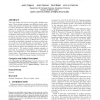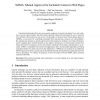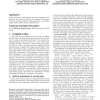CCS
2008
ACM
14 years 1 months ago
2008
ACM
Although biometrics have garnered significant interest as a source of entropy for cryptographic key generation, recent studies indicate that many biometric modalities may not actu...
CCS
2008
ACM
14 years 1 months ago
2008
ACM
Recent work has established the importance of automatic reverse engineering of protocol or file format specifications. However, the formats reverse engineered by previous tools ha...
CCS
2008
ACM
14 years 1 months ago
2008
ACM
This work studies the security of ten popular package managers. These package managers use different security mechanisms that provide varying levels of usability and resilience to...
CCS
2008
ACM
14 years 1 months ago
2008
ACM
A well-known concern in the setting of identity based encryption is that the PKG is all powerful and has to be completely trusted. To mitigate this problem, the notion of Accounta...
CCS
2008
ACM
14 years 1 months ago
2008
ACM
We present FairplayMP (for "Fairplay Multi-Party"), a system for secure multi-party computation. Secure computation is one of the great achievements of modern cryptograp...
CCS
2008
ACM
14 years 1 months ago
2008
ACM
Role Engineering is a security-critical task for systems using role-based access control (RBAC). Different role-mining approaches have been proposed that attempt to automatically ...
CCS
2008
ACM
14 years 1 months ago
2008
ACM
Cross-Site Request Forgery (CSRF) is a widely exploited web site vulnerability. In this paper, we present a new variation on CSRF attacks, login CSRF, in which the attacker forges...
CCS
2008
ACM
14 years 1 months ago
2008
ACM
Unrestricted information flows are a key security weakness of current web design. Cross-site scripting, cross-site request forgery, and other attacks typically require that inform...
CCS
2008
ACM
14 years 1 months ago
2008
ACM
CCS
2008
ACM
14 years 1 months ago
2008
ACM
Usage control is a generalization of access control that also addresses how data is used after it is released. We present a formal model for different mechanisms that can enforce ...



